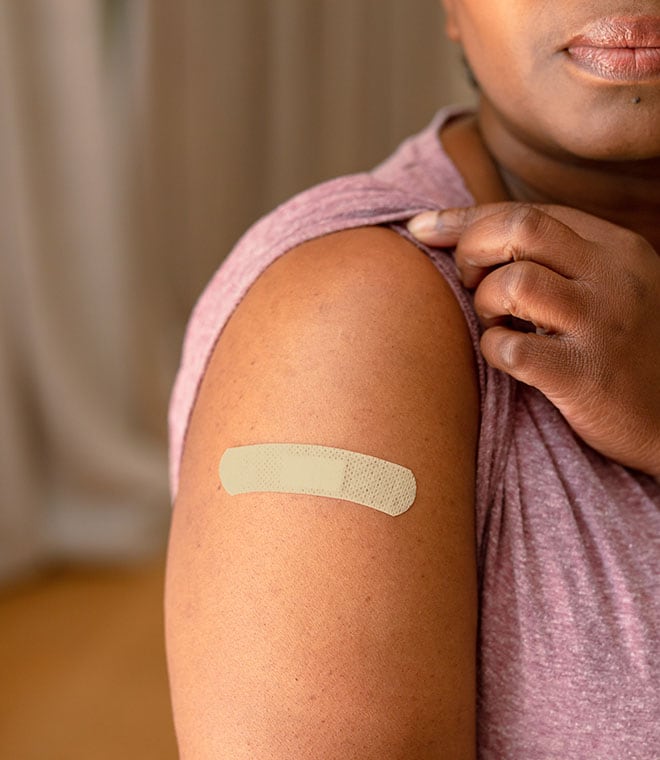Health
Hepatitis B vaccination can help you stay protected
By Christina Varvatsis, PharmD, BCPS May 18, 2023 • 7 min
Staying up to date with vaccines is an important part of preventive health. For example, most of us know that it's time to schedule our flu shot when fall rolls around. But what about other vaccine-preventable illnesses, such as hepatitis B? Learn more about this potentially serious condition and how vaccination can help you stay protected. And be sure to schedule your vaccine appointments, now and year-round, at Walgreens.com/ScheduleVaccine.
What is hepatitis B?
Hepatitis B is a serious liver disease caused by the hepatitis B virus. It is highly contagious and can spread when people come into contact with blood or other body fluids from an infected individual, including:
- Having sex with a partner who has hepatitis B
- Using contaminated needles, syringes or drug preparation equipment
- Sharing contaminated items, like toothbrushes, razors or medical devices, with a person who has hepatitis B
- Passing from a mother with hepatitis B to baby during childbirth
Hepatitis B may cause an acute (short-term) or chronic (long-term) infection:
- Acute hepatitis B occurs after a person is first infected with the virus. Symptoms may be flu-like and include fever, abdominal pain, fatigue, decreased appetite, nausea and yellowing of the skin or eyes (jaundice), though some people may not experience any symptoms. Most adults with acute hepatitis B will recover within a few months. However, about 5% of adults develop chronic hepatitis B.
- Chronic hepatitis B is a lifelong infection that can cause serious complications, including liver damage, cirrhosis, liver cancer and even death. Babies and young children infected with hepatitis B are more likely to develop this chronic form of the disease.
Fortunately, hepatitis B is a vaccine-preventable illness that you can easily protect yourself against.
Hepatitis B vaccine
The best way to prevent hepatitis B is by getting vaccinated. Hepatitis B vaccines are safe and effective, and available for all age groups.
The hepatitis B vaccine is recommended for:
- All infants
- All children, adolescents and adults between 19 and 59 years old who have not been previously vaccinated
- Adults 60 years and older with risk factors for hepatitis B who have not been previously vaccinated or adults 60 years and older without risk factors
For adults ages 19 to 59, there are five available hepatitis B vaccines, which are administered as a series of two, three or four shots.
- 2-dose series – Heplisav-B is administered by two doses, four weeks apart
- 3-dose series – Engerix-B, PreHebvrio, Recombivax HB and Twinrix (combination hepatitis A and B vaccines) are all available in a three-dose series and administered over a six-month period, with the second dose given one month after the first, and the third dose in month six
- 4-dose series – People undergoing kidney dialysis may have a lower antibody response than healthy individuals, so they can get four shots of Engerix-B over a six-month period. Twinrix can also follow a four-dose accelerated schedule over one month, with the fourth dose given one year after the first. This might be especially helpful for someone going on a trip out of the country.
Children and young adults can follow the two- or three-dose schedules, but parents should consult with their doctor to confirm the best vaccine. Adolescents ages 11 through 15 may use an alternative two-dose schedule of Recombivax HB, administered by two adult doses, four to six months apart, and should be completed by their 16th birthday.
Typically, newborns receive the shot within 24 hours of birth, the second shot at two months old, and the third at six months. The vaccine is generally safe for pregnant women, who should receive it if they have not been previously vaccinated. After receiving the full vaccination series, estimates suggest that protection from hepatitis B could last up to 20–30 years, and possibly for life. To learn more, visit the CDC website.
Infants and young children receive the shot in their thigh muscle, while the arm muscle is used for adolescents and adults.
The hepatitis B vaccine is NOT recommended for:
- Anyone who has had an allergic reaction to a prior dose or a component of the hepatitis B vaccine
- Anyone who has had an allergic reaction to yeast
- Anyone who has had an allergic reaction to neomycin
Insurance coverage for the hepatitis B vaccine
Hepatitis B vaccines are usually covered by health insurance and are available at no cost for qualifying Medicare Part B members. Insurance plans vary, so check with your insurance provider to find out if you’re covered.
Safety
The hepatitis B vaccine is safe and effective and the best way to protect yourself from becoming infected. Hepatitis B vaccines have been available since 1982, with over 1 billion doses administered worldwide.
Side effects are typically mild and resolve within one to two days. You may experience:
- Soreness, redness or swelling in the arm where you received the shot
- Headache
- Fever
Now is the best time to protect yourself against hepatitis B. The vaccine is available at Walgreens, and it’s easy to schedule an appointment at Walgreens.com/ScheduleVaccine. And be sure to speak to your pharmacist or healthcare provider to see which other vaccines you may be eligible for so you can schedule them all for the same visit.
Published May 2023.
Sources:
- https://www.cdc.gov/vaccinesafety/vaccines/hepatitis-b-vaccine.html
- https://www.cdc.gov/vaccines/adults/pay-for-vaccines.html
- https://www.who.int/news-room/fact-sheets/detail/hepatitis-b
- https://www.cdc.gov/vaccinesafety/vaccines/hepatitis-b-vaccine.html
- https://www.cdc.gov/vaccines/schedules/hcp/imz/adult-conditions.html
- https://www.fda.gov/media/119403/download
- https://www.twinrix.ca/en-ca/twinrix-dosing.html
- https://www.cdc.gov/vaccines/pregnancy/hcp-toolkit/guidelines.html




